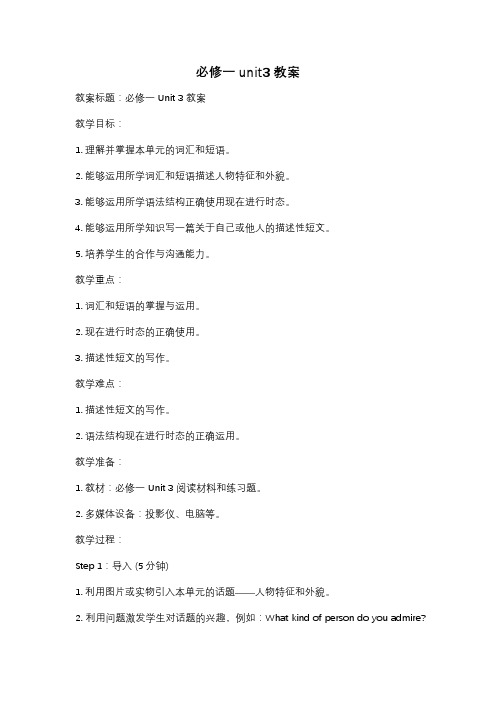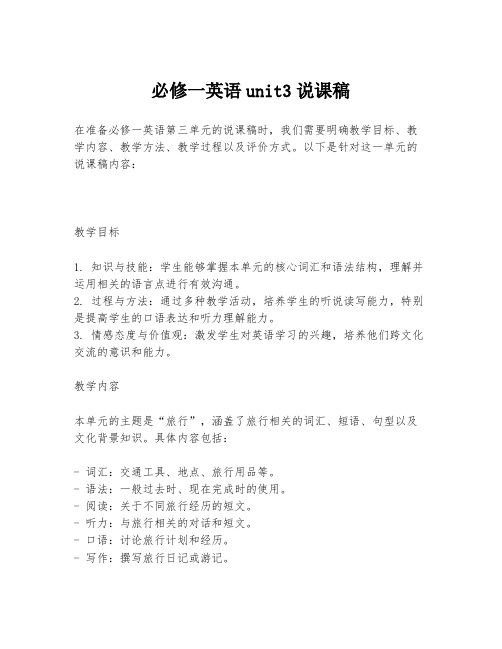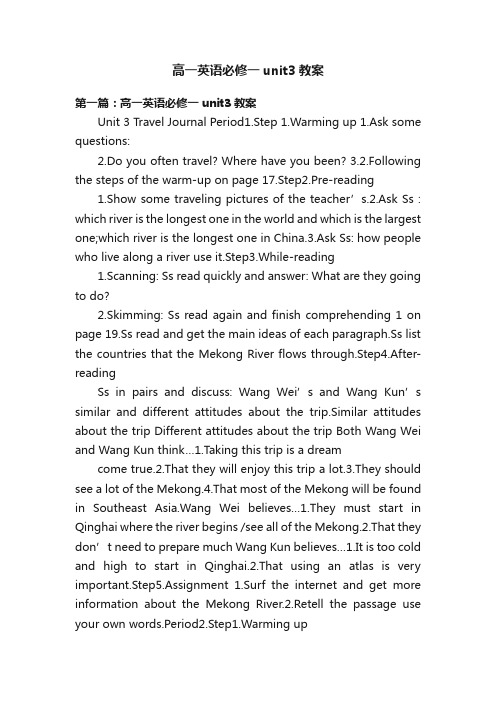【2017】(必修一)unit3第7课时教学设计
高中英语人教版必修1【教学设计】Unit 3

Unit 3 Travel journal本单元的中心话题是旅游,通过旅游日记的方法描述旅行见闻。
Warming Up 部分让学生想象自己住在青海,要去东南亚旅游。
要求他们选择三个不同的地方并查出不同交通方式及所需费用。
然后与同学讨论六个话题,使学生了解旅游的必要手段和必须备的费用。
Pre-Reading部分的两个问题主要是引导学生向阅读部分过度;Reading 部分“湄公河旅行日记(Journey Down the Mekong )”的第一部分讲述了王昆和王薇梦想往湄公河做自行车旅行,并为之做准备的过程;文章的第二部分A Night in the Mountain 放在“语言运用部分”中,主要讲述了他们在西藏山中度过的一宿,爬山路的艰苦和乐趣;Comprehending 部分通过回答问题、让学生填写表格在课文中找到王薇和王昆对旅行的相同和不同看法,加强学生对课文细节的进一步理解;Learning about Language 部分讲述了主要词汇及其运用和主要语法项目(用现在进行时表示将来)。
1) Key words and expressions :journal, fare, transport, prefer, disadvantage, fare, flow, cycle, persuade, graduate, finally, schedule, fond , be fond of , shortcoming , stubborn, care about , make up one ’s mind , determine, give in , valley, pace, altitude, bend, boil , forecast, parcel, reliable, organize, journey, insurance, wool, as usual, view , pillow, midnight, at midnight, flame, beneath, temple, cave, change one ’s mind,2) Key sentences:It was my sister who/that first had the idea to cycle along the entire Mekong River.She insisted that she (should) organize the trip properly.3) Grammar现在进行表将来:Where are you going on holiday?I am going to Hawaii on holiday.When are we coming back?2. Ability goals 能力目标1)Talk about travel and transportation2)Enable the Ss to get the main idea of the text.3)Understand the text and answer the following questions:4)Enable the Ss to understand the details about the passage.5)Retell the passage using the first person.3. Learning ability goals 学能目标1)Let the Ss know how to get the main idea of the text.2)Get the Ss to know how to answer the questions about the passage.3)Enable the Ss to retell the passage using the first person.(1).To be able to get the main idea from the text.(2)To be able to solve the problem by analyzing.2. Teaching difficult pointTo be able to use the different learning strategies for different reading purposes.2)Asking-and-answering activity to check the Ss’ understanding of the text.3)Individual, pair or group work to finish each task.4)Discussion.A recorder, a computer, a projector。
必修一unit3教案

必修一unit3教案教案标题:必修一 Unit 3 教案教学目标:1. 理解并掌握本单元的词汇和短语。
2. 能够运用所学词汇和短语描述人物特征和外貌。
3. 能够运用所学语法结构正确使用现在进行时态。
4. 能够运用所学知识写一篇关于自己或他人的描述性短文。
5. 培养学生的合作与沟通能力。
教学重点:1. 词汇和短语的掌握与运用。
2. 现在进行时态的正确使用。
3. 描述性短文的写作。
教学难点:1. 描述性短文的写作。
2. 语法结构现在进行时态的正确运用。
教学准备:1. 教材:必修一 Unit 3 阅读材料和练习题。
2. 多媒体设备:投影仪、电脑等。
教学过程:Step 1:导入 (5分钟)1. 利用图片或实物引入本单元的话题——人物特征和外貌。
2. 利用问题激发学生对话题的兴趣,例如:What kind of person do you admire?Why?Step 2:词汇和短语学习 (15分钟)1. 呈现并教授本单元的词汇和短语,例如:appearance, personality, confident, determined, etc.2. 运用图片和例句帮助学生理解和记忆词汇和短语。
3. 进行词汇和短语的练习,例如:单词拼写、填空等。
Step 3:语法学习 (20分钟)1. 介绍现在进行时态的用法和构成。
2. 利用图片和例句帮助学生理解和记忆现在进行时态的用法。
3. 进行现在进行时态的练习,例如:选择填空、改错等。
Step 4:阅读理解 (15分钟)1. 学生阅读本单元的阅读材料,并回答相关问题。
2. 学生之间进行小组讨论,分享自己的理解和答案。
3. 教师进行解答和讲解,帮助学生更好地理解和掌握阅读材料。
Step 5:写作练习 (20分钟)1. 学生根据所学词汇、短语和语法结构,写一篇关于自己或他人的描述性短文。
2. 学生之间进行互相交流和修改,提供反馈和建议。
3. 部分学生展示自己的作文,进行班级评价和讨论。
人教版英语必修一Unit 3(主题阅读课)教学设计

Instruction Design for Reading高中英语主题阅读课教学设计唐山五中王娜一.整体设计思路、指导依据说明目前,中学生阅读能力在速度上与可能达到的指标相比普遍要低几倍,甚至十几倍。
随着信息时代的到来,人们急需尽快获取各种信息资料,成倍提高工作效率与学习效果,培养学生的快速阅读理解能力是实施英语素质教育的必然要求。
然而,训练学生阅读速度必须建立在学生对文章内容处于陌生状态的基础上,因此,本节课旨在培养他们的阅读兴趣,养成快速阅读习惯和快速阅读理解能力。
根据新课程标准的要求,在教学活动中应该注重发展学生的语言技能、语言知识、情感态度、学习策略和文化意识五个方面的素养,培养其综合运用语言的能力,在教学活动中要有情景创设、学生探究、学生自主处理问题以及巩固训练等环节,以便于培养学生自主学习的能力。
本课在这样的教学目标的指引下,力求实现知识性与人文性的统一。
本节课以Traveling为话题,旨在通过阅读课使学生了解世界各地的旅游胜地,实现阅读能力与表达能力的提高,引导学生用不同的方法阅读文章,通过略读和查读方法训练学生的阅读能力,从而提高学生的阅读能力。
一方面设置了环环相扣的阅读任务,对重要文本信息进行深入处理,训练学生的阅读技能;另一方面重视文本的人文性内涵和学生对文本的情感体验。
在活动设置上,教师不把知识性活动和人文性活动割裂开来或是简单罗列,而是力求融合二者,使学生在巩固阅读技能、输出所学语言的同时学到切实可用的知识,培养教育学生认识到旅行的意义,用旅游来陶冶情操,从而使学生做文明的旅行者。
二.教学背景分析教学内容分析:对于高一年级的学生来说,部分学生已经有了一定的英语学习基础,掌握了一点英、美国家日常生活中的不同传统特点,但总体上来说,还比较少。
旅游课题的安排与学生的生活紧密相连,也是他们很感兴趣的话题,如有机会,他们也很想出国亲身体验其他国家与中国不同的旅游胜地,风土人情和传统生活.基于现实生活,只能引导学生在课堂上发挥丰富的想象力,把课堂模拟成生活,设置阅读篇目,提高语言交际能力.但大部分学生对于西方国家的旅游胜地、风土人情和传统生活所知甚少,加之学生英语成绩的分化比较严重,所以要求学生能课前认真做好预习,借助网络、图书馆和书籍,了解不同地区传统生活的特点和差异,培养自学能力。
人教版 高中英语必修一 Unit 3 教案

Step 2 Pre-writing
1.老师向学生展示健康簿,并让学生们谈谈对其的了解,借此激活学生的背景知识,激发学生的好奇心和求知欲。
2.让学生阅读语篇,完成课本P42活动1,通过活动1的三个问题帮助学生理解文章的主要内容。
3.让学生再次阅读语篇,通过填写表格梳理Kayla前后的变化,以及这些变化带来的结果。
4.让学生再次阅读语篇,完成课本P42活动2,梳理健康簿的文本结构,分析其写作技巧。
5.让学生完成课本P43活动3的1和2,为接下来的写作收集素材。
Step 3 While-writing
1.让学生借助刚刚积累的素材,结合写作提纲列出写作要点,以及表示对比的语言。
教学
重点
1.指导学生通过阅读,学习健康簿的文本结构和语言特色。
2.指导学生正确描述健康方面的问题和解决办法,让他们学会使用比较和对比的方法,描述事物前后的变化。
教学难点
1.引导学生运用所学知识为班级健康簿编写一页内容。
2.培养学生关注健康的意识,形成正确的健康观。
教
学
内
容
与
过
程
Step 1 Lead-in
SБайду номын сангаасep 5Homework
According to the teacher’s and students’evaluation, polish your page for yourclass wellness book and then hand in it before the next class.
备注
2.结合写作提纲和P43活动3的3给出的提示,写出初稿。
必修一英语unit3说课稿

必修一英语unit3说课稿在准备必修一英语第三单元的说课稿时,我们需要明确教学目标、教学内容、教学方法、教学过程以及评价方式。
以下是针对这一单元的说课稿内容:教学目标1. 知识与技能:学生能够掌握本单元的核心词汇和语法结构,理解并运用相关的语言点进行有效沟通。
2. 过程与方法:通过多种教学活动,培养学生的听说读写能力,特别是提高学生的口语表达和听力理解能力。
3. 情感态度与价值观:激发学生对英语学习的兴趣,培养他们跨文化交流的意识和能力。
教学内容本单元的主题是“旅行”,涵盖了旅行相关的词汇、短语、句型以及文化背景知识。
具体内容包括:- 词汇:交通工具、地点、旅行用品等。
- 语法:一般过去时、现在完成时的使用。
- 阅读:关于不同旅行经历的短文。
- 听力:与旅行相关的对话和短文。
- 口语:讨论旅行计划和经历。
- 写作:撰写旅行日记或游记。
教学方法1. 任务型教学法:通过设计旅行计划、分享旅行经历等任务,让学生在实际语境中运用语言。
2. 合作学习:小组合作完成项目,促进学生之间的交流与合作。
3. 多媒体教学:利用图片、视频等多媒体材料,增强学习的趣味性和直观性。
教学过程1. 导入(Lead-in):通过展示世界各地的图片或视频,激发学生对旅行的兴趣,引入本单元主题。
2. 新课呈现(Presentation):教授新词汇和语法结构,通过例句和情景对话让学生理解其用法。
3. 练习(Practice):通过填空、转换句型、角色扮演等活动,巩固学生对新知识的掌握。
4. 应用(Application):设计小组讨论、模拟旅行计划等活动,让学生将所学知识运用到实际情境中。
5. 总结(Summary):回顾本单元的重点内容,鼓励学生进行自我反思。
6. 作业(Homework):布置相关的写作或口语作业,如写一篇旅行日记或准备一个关于旅行的口头报告。
评价方式1. 形成性评价:通过课堂表现、小组活动和口头报告等方式,持续跟踪学生的学习进展。
英语必修一unit3教案

英语必修一unit3教案教案标题:英语必修一Unit 3: Travel journal教学目标:1. 通过本单元的学习,学生将能够掌握有关旅行和文化交流的词汇和表达方式。
2. 培养学生的听、说、读、写的综合能力,提高他们的语言运用能力。
3. 培养学生的跨文化交流意识和能力,增强他们对不同文化的理解和尊重。
教学重点:1. 词汇和短语:travel, journey, destination, explore, cultural exchange, customs, traditions, etc.2. 句型结构:What's your destination? How do you feel about...? Have you ever been to...?教学难点:1. 学生能够熟练运用所学词汇和句型进行口头和书面表达。
2. 培养学生的跨文化交流意识和能力,使他们能够更好地理解和尊重不同文化。
教学准备:1. 教材:英语必修一教材Unit 3相关课文和练习题。
2. 多媒体设备:投影仪、电脑、音频设备等。
教学过程:Step 1: 导入新课1. 利用多媒体设备播放一段关于旅行的视频,激发学生对旅行的兴趣。
2. 引导学生谈论自己最喜欢的旅行目的地,并分享他们的旅行经历。
Step 2: 课文阅读1. 学生阅读课文,并回答相关问题,检查他们对课文内容的理解程度。
2. 分组讨论:学生根据课文内容,讨论自己对旅行和文化交流的看法,并展示他们的观点。
Step 3: 词汇与表达1. 教师呈现本单元相关词汇和短语,并进行发音和词义解释。
2. 学生进行词汇和短语的搭配练习,通过口头和书面表达巩固所学内容。
Step 4: 句型训练1. 教师呈现本单元相关句型,并进行语法解释和例句演示。
2. 学生进行句型练习,通过角色扮演和对话练习,提高他们的口语表达能力。
Step 5: 语言运用1. 学生完成课本中相关练习题,巩固所学内容。
新教材高中英语人教版必修第一册Unit3教学设计

Lesson Plan for M1U3 Living LegendsEnding(1min)To share their draft.words.Step6 Homework (1min)To polish the draft To search for moresupporting evidenceabout the legend youchoose and polish thewriting.To practise writingskills.IV.Blackboard Writing DesignLangping Jordancapability As.., As..., As..Seem toSeem todevice Parallelism HyperboleEvidence2015 world cup What he says and doesTraits Devoted, determined,inspiring Devoted, determined, generous, inspiringV.Reflection新课程理念之下,阅读课应该不仅仅关注学生的读,更要关注学生读的策略培养,以及读中、读后的思与言。
因此,在本次教学设计中,学生在教师的引导下去关注文中的有效信息,读取隐藏信息,寻找信息沟,同时教师可以补充适当的背景信息,帮助学生填补这个信息沟,并且在这个过程中,引导学生关注语言这个媒介,引导学生分析语言的特点,为学生的写做好铺垫。
同时,在理解的基础上,教师引导学生进一步思考,通过推断、分析、对比、综合锻炼学生的思维能力,最终通过写语言或者说语言等输出形式引导学生对课文的语言进行运用、基于原文话题进行创造,在这个过程考察锻炼学生的综合能力。
M1Unit3 Living Legends。
高一英语必修一unit3教案

高一英语必修一unit3教案第一篇:高一英语必修一unit3教案Unit 3 Travel Journal Period1.Step 1.Warming up 1.Ask some questions:2.Do you often travel? Where have you been?3.2.Following the steps of the warm-up on page 17.Step2.Pre-reading1.Show some traveling pictures of the teacher’s.2.Ask Ss : which river is the longest one in the world and which is the largest one;which river is the longest one in China.3.Ask Ss: how people who live along a river use it.Step3.While-reading1.Scanning: Ss read quickly and answer: What are they going to do?2.Skimming: Ss read again and finish comprehending 1 on page 19.Ss read and get the main ideas of each paragraph.Ss list the countries that the Mekong River flows through.Step4.After-readingSs in pairs and discuss: Wang Wei’s and Wang Kun’s similar and different attitudes about the trip.Similar attitudes about the trip Different attitudes about the trip Both Wang Wei and Wang Kun think…1.Taking this trip is a dreamcome true.2.That they will enjoy this trip a lot.3.They should see a lot of the Mekong.4.That most of the Mekong will be found in Southeast Asia.Wang Wei believes…1.They must start in Qinghai where the river begins /see all of the Mekong.2.That they don’t need to prepare much Wang Kun believes…1.It is too cold and high to start in Qinghai.2.That using an atlas is very important.Step5.Assignment 1.Surf the internet and get more information about the Mekong River.2.Retell the passage use your own words.Period2.Step1.Warming upAsk some Ss to retell the passage that they have learnt last period.Step2.Learning about the languageTeacher explains some language points in the text on page 18.1.Persuade sb.into /out of sth.: cause sb.(not)to do sth.by arguing or reasoning with him 说服或劝说某人(不)做某事He is easily persuaded.Wang Kun couldn’t persuade his sister to change her mind.persuade sb.(that clause): cause sb.to believe sth.;convince sb.使某人信服How can I persuade you that I am telling the truth?2.insist(v.): demand(sth)forcefully, not accepting a refusal 坚持或坚决要求;eg.Since he insisted, I had to stay.insist on sth/doing sth: require or demand;refuse to accept an alternative 一定要(某事物),坚决主张She insists on getting up early and playing her radio loud.3.care about: be worried, concerned or interested 忧虑,关心,惦念don’t you care about anybody? I don’t care about what happens to him.care for /to do: be willing or agree to do sth.;wish or like to do sth.Would you care a drink? Would you care to go for a walk? care for sb.1).Like or love sb.He cares for her deeply.2).Look after sb;take care of sb;be responsible for sb Who will care for your child if you are out?4.Once she has made up her mind, nothing can change it.她一旦下了决心,什么也不能使她改变。
- 1、下载文档前请自行甄别文档内容的完整性,平台不提供额外的编辑、内容补充、找答案等附加服务。
- 2、"仅部分预览"的文档,不可在线预览部分如存在完整性等问题,可反馈申请退款(可完整预览的文档不适用该条件!)。
- 3、如文档侵犯您的权益,请联系客服反馈,我们会尽快为您处理(人工客服工作时间:9:00-18:30)。
Step 1 GreetingsStep 2 SpeakingT:Today,I’ll first show around some famous dams in the world.Show the picture of Aswan Dam,the Hoover Dam and some famous Dams.Aswan Damthe Hoover Dam in Colorado,USAT:What do you think of these Dams?S1:They are wonders on the earth.It is said that the Aswan Dam is one of the three man-made projects that can be seen fr om space.S2:They not only look wonderful but also help the people in the world a lot.S3:...S4:...T:But I hear that a very effective international movement arose to fight for change in current dam building practices.Now I wonder why they did so.Are there any bad things caused by dams?I would like you to hold a discussion and talk about the good things and bad things dams bring about.good things1.control floods2.make electricity3.raise the capacity of shipping(The raised water level makes it possible for heavy-loaded ships to pass.)4.bring new scenerybad things1.force the people from their land and homes2.forever change some of the most historically celebrated scenery in the area(the Three Gorges Dam)3.(the Aswan Dam)Some old temples are in danger because of the raised water level.People had to remove the temple stone by stone.It took 1700 workers and 22 other people four years to complete the project and cost one billion US dollars.4.(refugees)be economically,culturally,and psychologically devastated.Some people of Sichuan Province had to move to other places of China,for example,Chongming Island.It will be a great challenge for these people to merge in a new society.5.(people in the Mekong Delta)suffer from diseases dams and large irrigation projects in the tropics bring.6.(In Nile Delta)plain and the delta are losing fertility as the mineral sediments usually carried and deposited by the Nile are building up behind the many dams.7.The construction of dams in Southeast Asia has brought some of the countries into heavy debts.高峡出平湖T:So I think before we do anything,we should think it over.Step 3 New informationT:Boys and girls,we have been talking about travel these days.Now,what have you known about travel now?Can you list some useful words and expression about it?S1:Travel fare,means of transport,travel manners,safety,destination,insurance,equipment,travel necessity,travel tips,travel journal,travel advertisement,travel poster.T:Can you think of some useful verbs or verb phrases?S2:make camp,put up the tents,cycle along../cycle across,set out/off,get close to nature,be tired from,be bra ve,wear a hat and sunglasses.T:What should we pay attention to when we go traveling?S3:We should pay attention to our travel manners.Don’t throw rubbish here and there.Don’t feed animals in the zoo or in the wild.Don’t carve on trees of walls or chair.Don’t smoke in the wood or forests.We should obey rules.S4:We should take care of ourselves.Prevent anything dangerous from happening.If danger came,we should know how to get rescued.S5:We should get to know the customs of the place to avoid conflicts with the local people.S6:...T:What you say reminds me of eco-travel.Have y ou ever heard of it?Present the definition of eco-travel on the screen.Ask one of the students to read it.Eco-travel is a form of travel that combines normal tourism with learning.Instead of traveling for pleasure,you can use your trip as a way to protect the environment.Normal tourism is often bad for the environment,and tourist often cause problems.Eco-travel,on the other hand,is a way to travel responsibly.Eco-tourists want to learn about the world so that they can make it better or at least understand it better.Eco-travel is a way to find what can be done to helpanimals and plants as well as people.Step 4 WritingT:We all know Wang Wei will take a bike trip along the Mekong.Suppose you are a friend of hers and you want to express your best wishes to her before she starts.What will you say?S1:Have a nice/wonderful/good time.S2:Have a good trip.S3:Good luck on/with your journey.S4:Take care.S5:Have fun.S6:Please enjoy yourself.S7:Give my love/best wishes/best regards to your fellows.T:Good.Now Wang Wei has gone.You are worried about her,so you write a letter to her,asking her what she feels and what she is doing,and also asking her about some of the places you are interested in but have never been before.Give Ss some minutes to prepare.T:Who will be the volunteer to read your letter?S8:My dear brave little Wei,How I worry about your health and safety.I guess you are now on the Tibetan plateau.What is the weather like?Are you feeling OK now?A few days later,you will reach the Mekong Delta.I hear that the area was mostly marshl and and forest.Would you please take some videos there so that I can appreciate the wonderful scenery after you come back?Since the weather is changeable and the topography is complicated,you should always take care.Good luck on your trip.Yours,Jane Step 5 WritingT:Here is good news for you.You and friends are allowed to run a travel business now.Would you form your travel agency at once?Don’t forget to give it a good name.Give Ss a few minutes to fulfill the task.T:Now can you tell me the names of your company?S:Eagle,Rose Magnificent,...T:Now,please read the tips on Page 60,and then write your travel advertisement.Give Ss a few minutes to fulfill the task.T:Since time is limited,you can improve your poster after class,please make sure that your poster looks if both businesspeople and artists made it.No w turn to the last task of this unit.Please look at Page 23 “Reading and writing”.Will Li Ming read this part?S:...T:Do you know what a travel dairy is and what travel journal is?Present two passages on the screen:T:Which is a travel journal and which is a travel diary?S:The first one is a travel journal while the second is a travel dairy.T:The 7-day National Holidays is coming,I’d like you to form your own travel group and design an eco-travel.You should first decide your favorite destination by listing the reasons.After your trip,you should also write a travel journal.You can put up some of the journals on the classroom wall,which the other classmates will ter we will find out who are the winners.Step 6 Homework.●板书设计Unit 3 Travel journaGood things1.control floods2.make electricity3.raise the capacity of shipping4.bring new scenery Bad things1.force the people from their land and homes2.forevercelebrated scenery in the area3.Someraised water level.4.psychologically devastated.5.sufferprojects in the tropics bring.6.plainmineral sediments usually carried and deposited by the Nile are building up behind the many dams. 7.The construction of dams in Southeast Asia has brought some of the countries into heavy debts.。
